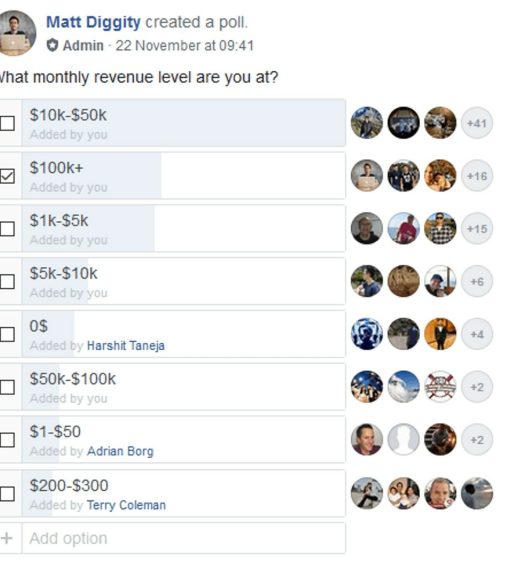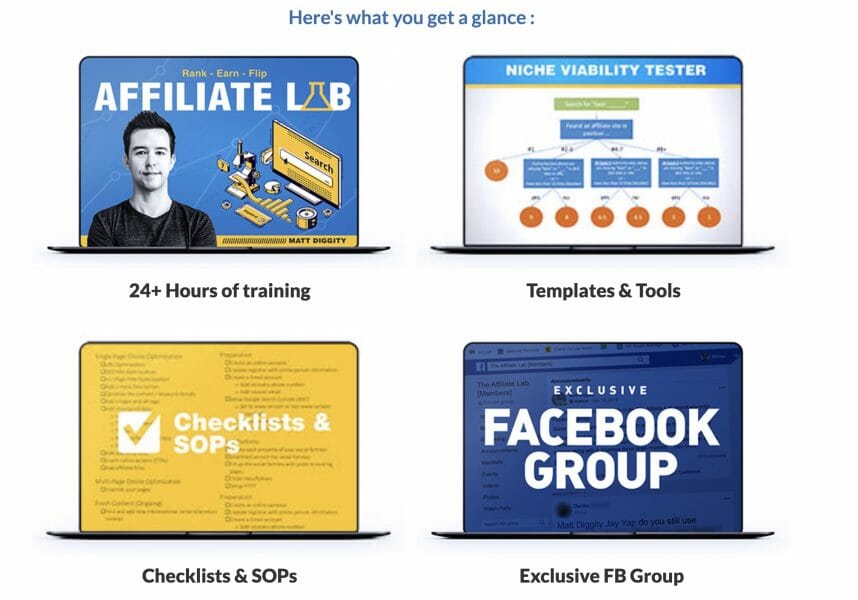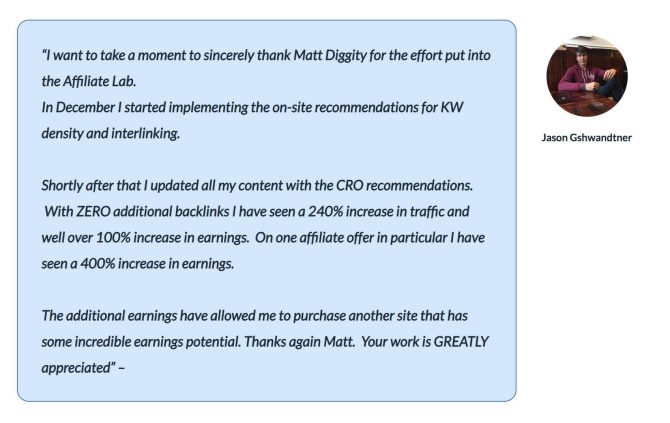With the constant demands of the traditional 9-to-5 grind, it’s understandable if you find yourself seeking alternative ways to earn a substantial income without the associated stress and long hours.
This is where affiliate marketing comes into play.
In this guide, drawn from our extensive experience in the field, we’ll provide you with all the information you need to know about affiliate marketing.
We’ll cover the fundamentals of how it works, the various types of affiliate websites, and the best places to learn affiliate marketing as a beginner.
Table Of Contents
- What Is Affiliate Marketing?
- Pros & Cons Of Affiliate Marketing
- Different Affiliate Marketing Types
- How to Learn Affiliate Marketing In 5 Steps
- Affiliate Networks
- How Much Money Can You Make From Affiliate Marketing?
- Why Most People Fail At Affiliate Marketing
- Other Tips & Strategies
- The Best Way To Learn Affiliate Marketing
- Why Should You Do Affiliate Marketing?
What Is Affiliate Marketing?
Affiliate marketing is a form of revenue sharing and a great way to earn passive income. At its most basic, there are two parties involved in an affiliate partnership:
• The merchant/business, who is responsible for creating, pricing, and distributing the product; and,
• The affiliate, who is responsible for marketing the product and getting customers to buy from the merchant
Affiliates can work directly with businesses whose products they like. You can also go through an affiliate network, which we’ll discuss in detail later in the guide.
Affiliates partner with a business to promote their products and services, usually through a unique code or referral link. Every time someone buys from the business using the code/link, the affiliate earns a small commission from the affiliate marketing program.
Pros & Cons Of Affiliate Marketing
PROs:
1. No Upfront Costs: Unlike traditional businesses, affiliate marketing doesn’t require a significant investment. You only need a computer, internet, and a small budget to build your website.
2. Flexible Schedule: You are your own boss. You can work from anywhere and set your own hours.
3. Passive Income: Affiliate marketing allows you to earn money even when you’re not actively working. A single well-ranked article can generate income for years.
4. Easy Scalability: With low overhead costs, you can easily expand your affiliate marketing business without major expenses.
5. No Expertise Needed: You don’t need specific qualifications or prior experience to succeed in affiliate marketing. Learning and testing techniques along the way are part of the process.
CONs:
1. No Guaranteed Earnings: You only earn when a customer clicks on your affiliate link and makes a purchase. Your earnings are not guaranteed, especially if you don’t put in the necessary effort.
2. Limited Control: Despite promoting the product, conversion, and product quality are controlled by the merchant, not you.
3. Requires Investment: To achieve success, you need to invest both time and money in website development, marketing strategies, and content creation.
4. High Competition: The low entry barrier means there are many others competing for the same customers in the affiliate marketing industry. You have to stand out and be smart if you want to succeed in affiliate marketing.
5. Requires Patience & Motivation: Affiliate marketing doesn’t yield immediate results. It may take months to start earning a profit, requiring patience and persistence.
Different Affiliate Marketing Types
There are plenty of ways to promote affiliate products, but the most common (and most profitable) is through a website. Building an affiliate site doesn’t require much capital or web design experience. With a little time and patience, you can easily create one using WordPress templates or website builders.
But before you set that up, you need to decide what kind of website you’re building. Below are the different kinds of affiliate sites that you can use to promote products.
Reviews
Creating a review website is a great way to incorporate affiliate links into your content. Review sites aid purchasing decisions by comparing products and featuring customer feedback. Ensuring your reviews are fair and honest, and providing high-quality, useful content is crucial.
You should be publishing quality in-depth content that readers will find useful. Make sure your reviews are always fair and honest. Don’t recommend products just because you can earn a commission on them; that will chip away at any trust and credibility you’ve built with your readers.
Dave Foy of DesignBuildWeb has some great advice on creating content.
“Provide real value. Many affiliates write quick, generic reviews, without any real opinions, and then wonder why they don’t make sales. Instead, think of how you can provide insane value for your audience. How can you pull out all the stops with your content to make it THE go-to content for your particular niche,” the marketing expert advised.
“I personally think it’s better to create fewer pieces of content but make each one the absolute best there is on your subject matter, rather than lots of generic ‘meh’ content.”
There are two kinds of review sites:
• General review sites, which cover affiliate products across a wide range of categories. For example, Wirecutter reviews electronics, appliances, credit cards, medical supplies, outdoor gear, cars, and so much more. The advantage of a general review site is that there’s no limit to what kind of products you can offer. The disadvantage is that being a jack-of-all-trades makes it difficult to build authority.
• Niche review sites, which promote products in a particular industry or niche. For example, RunnerClick reviews mostly running shoes, exercise clothes, sports watches, gym equipment, and other fitness-related items. The disadvantage of a niche review site is that you’re stuck with promoting products in a specific category. The advantage is that you can establish yourself as an expert within that niche community, making your reviews more trustworthy.
Price Comparisons
People like price comparison websites because they can easily see the price of two or more products at a glance. Think of it like a review site that focuses on just one aspect of the product: how much it costs.
A great example of a price comparison website is Skyscanner, where you can compare the price of different airlines for the same route.
Instructional Websites
Great content is fundamental to successful affiliate marketers in the same way that it’s fundamental to optimizing for search engines. The best way to drive traffic to your site and start affiliate marketing is by providing content that’s useful, informative, and relevant to your readers. And nothing is more useful than a how-to website.
How-to or instructional websites provide step-by-step instructions on how to complete a specific task.
You can easily sneak in a few affiliate links to products and services that could help people complete those tasks.
Many how-to websites earn commissions on related products. For example, Website Setup teaches people how to build websites from scratch, and it links out to web hosting services, paid affiliate marketing course, and the like.
Coupon Sites
Coupon websites offer digital discounts. These sites attract many users, with customers receiving discounts and affiliates earning commissions. It’s something to consider if you plan to start affiliate marketing.
There are a bunch of coupon affiliate programs you can start with.
One of the most popular coupon sites in the UK is Voucher Codes. Voucher Codes has discount coupons for more than 2,000 retailers, restaurants, and more.
Free Tools & Resources
Websites providing free tools (e.g. credit card debt calculators) generate significant traffic and income. Affiliate links to related products can be included. Money Saving Expert is a good affiliate business model for instance, it links to credit card companies through a credit card eligibility calculator.
Blogs
Finally, let’s talk about the most common affiliate business model: the blog. Personal blogs usually make the bulk of their income by recommending their favorite products to their readers.
Blogs have the lowest barrier to entry since you can write about anything you want and then sneak in an affiliate link here or there. The problem with blogging is that you need to build an audience first before you start seeing significant results.
A great example of a successful affiliate blog is Michelle Schroeder-Gardner’s “Making Sense of Cents”. What was originally a personal account of her journey towards financial independence is now a high-earning educational finance blog.
How to Learn Affiliate Marketing In 5 Steps
- Choose Your Niche
- Develop Your Strategy
- Create A Website
- Research Your Products
- Promote Your Affiliate Links
In this section of the guide, you’ll learn how to choose a profitable niche, the best way to drive traffic to your money site, and how to avoid the most common mistakes that affiliate marketers make.
For a more in-depth dive into affiliate marketing, make sure to register for our FREE webinar here.
1. Choose Your Niche
It doesn’t have to be something you’re an expert in, but it should be something that you find interesting or have a passion for. No matter what you’re interested in, there’s always going to be an opportunity for an affiliate program. You can promote physical products, information products, or services.
One of the secrets to affiliate marketers’ success is to stick with whatever niche you’ve chosen. As Digital Millionaire’s Brandon explains,
Check this video to learn more about niche selection and how it can help you get 6-figures per month revenue.
2. Develop Your Strategy
If you want your affiliate marketing business to make money, you need to have a plan in place first. A solid marketing strategy will help you avoid wasting time and resources while maximizing your income.
Creating a marketing strategy saves time and resources. This involves figuring out your schedule, conducting keyword research, and developing content ideas.
Struggling with your strategy? YouTuber and affiliate marketer Tanya J. Joseph shares this advice: “Don’t reinvent the wheel. Look at your competitors, see what’s working, and just model success.”
3. Create A Website
Your website is your money-maker, so don’t be afraid to invest in it to make it better. This doesn’t necessarily mean you have to shell out thousands of dollars for professional web design, though.
You can build a website on your own without much capital. You can choose from literally thousands of templates, or use a website builder.
Also, you’ll need a beginner-friendly web hosting service for your affiliate site.
4. Research Your Products
At this point, you might already have a shortlist of products that you want to push. But before you invest any time or resources into promoting them, you have to be sure that they’re worth the investment.
A great way to gauge interest in the products is by looking them up on Google Trends. Trends allow you to see how many people are searching for those products and when. By analyzing this data, you’ll be able to pinpoint which products have a high demand, which will get more popular over time, and which would just be a waste of your time.
5. Promote Your Affiliate Links
Marketing your content is essential if you want to drive traffic and increase your profits.
There are many platforms you can take advantage of. Social media sites like Facebook, Twitter, and Instagram all offer organic and paid ways to reach your audience. You can also tap influencers to promote your content to their followers.
The Affiliate Lab has some great modules on how to drive traffic from search engines and social media.
In this next section, you’ll learn more about two marketing strategies that affiliate marketers love to use: search engine optimization and pay-per-click advertising.
SEO
Search engine optimization (SEO) helps your website rank high in search engines. The higher your rank for your target keywords, the more likely users will click on your website.
If you can take the basic principles of SEO and apply them to your affiliate marketing business, then you could drive a significant amount of traffic to your money site.
Pay-Per-Click
Another way you can reach people is through pay-per-click advertising. You can find PPC ads all over the web in the form of banner ads, native ads, and more. You can even buy the top spot of the SERP so that your ad shows above the organic results.
The great thing about PPC ads is that you only pay when someone clicks on it. Of course, this doesn’t guarantee that the person clicking on your ad will also click on your affiliate link and buy from your partner merchant. But it gets them through the door, and that’s already a huge step.
There’s one caveat: PPC campaigns don’t work for all affiliate marketers. If you make a very small profit off the items you promote, then a PPC campaign might be too costly for what it gets you in return. You need to know what your potential profit margins are before you can decide how much to spend on an ad.
Affiliate Networks
As an “independent agent,” an affiliate marketer can negotiate personal arrangements with merchants, including more favorable rates. However, this leverage often comes with experience.
Enter affiliate networks.
Acting as intermediaries between merchants and affiliate marketers, these networks dictate terms and commission rates, typically lower than direct affiliate programs due to their fee. Despite this, they offer one substantial benefit: access to a vast merchant network, expanding your product options and potential income streams.
The Best Affiliate Networks For Beginner Affiliate Marketers
There are thousands of affiliate programs that make big promises, but you have to find the few that actually deliver.
If you’re a beginner affiliate marketer, check out these popular networks below:
How Much Money Can You Make From Affiliate Marketing?
If you consistently drive traffic to your money site and create high-quality content that people want to read, then earning a decent passive income as an affiliate marketer is entirely possible. Some people keep it on as a side hustle, but some star affiliate marketers make so much that it becomes their full-time job. Digital marketing can really turn your life around.
A 2017 study by VigLink found that 9% of affiliate marketers made more than $50,000 in 2016. The vast majority – around 65% – said that affiliate marketing was responsible for 5-20% of their annual income.
Some outliers even earn millions annually, like Jason Stone who amassed $7-million in 18 months through sales and affiliate marketing.
The affiliate marketers who have made the most money are generally those who have been at it for longer and developed better affiliate marketing strategies. Around ⅗ of the highest-earning affiliates have been in the business for five or more years.
At The Affiliate Lab, one of our favorite ways to earn money is by flipping the website once it becomes a high earner. Selling your affiliate site can earn you up to 30x your monthly profit. That means that a website making $5,000 a month could be worth $150,000.
Why Most People Fail At Affiliate Marketing
Most people fail at affiliate marketing because it requires passion, dedication, and a solid work ethic – not everyone has what it takes to be a successful affiliate marketer.
If you get into this with the expectation that you will become a millionaire overnight with free affiliate marketing, you will most likely fail. You have to be willing to put in the time and learn affiliate marketing strategies. And you need to have the patience to stick with it, even if you are months (or years) away from your goal.
“The lazy affiliates will give up and quit, and probably go do something else,” said Attila O’dree of iAmAttila.com. “Whereas the best will adapt by focusing on playing by the rules to be able to spend and get traffic, and making up the profits elsewhere.”
Late last year, we asked some of our Affiliate Lab members how much they were earning. A HUGE majority were making $10-50,000 per month, with several more hitting $50k+ and $100k+ monthly revenue. Of course, there were some still hitting less than $300 a month, but most of our long-time members were making bank.
The truth is that most people quit before they start seeing results. This is why one of our bonus modules at The Affiliate Lab is all about maintaining the right mindset for success.
Other Tips & Strategies
• Understand your audience. Find out what your readers’ biggest challenges and pain points are. Then, choose products that would help them solve those problems.
• Provide value to your readers. Above all else, make sure that you’re providing high-quality, well-researched, and well-made content. Everything else will follow.
• Build trust & credibility. Be transparent with your audience about your commissions, and only promote products that you actually like.
• Track your results. Measuring your results is the best way to find out which of your strategies are working. This will also help you identify your highest-performing products.
• Think of the Pareto principle. The Pareto principle is also known as the 80/20 rule. In the case of affiliate marketing, this means that you should spend 20% of your time learning affiliate marketing’s ins and outs, while 80% should be applying what you’ve learned. Another way to apply this principle: 80% of your income will come from 20% of your efforts. Find out what that 20% is and make that the focus of your affiliate strategy.
The Best Way To Learn Affiliate Marketing
Affiliate marketing is not for everyone. But for the hardworking few who are willing to put in the time and effort, an affiliate website can be a major cash cow.
By promoting other people’s products and services, you can earn a decent passive income without worrying about the upfront costs of starting a business. There’s a niche for you no matter what your interests are.
Next you want to join an affiliate network. With access to hundreds or even thousands of potential merchants, you can build the foundation for your affiliate marketing empire.
But if there’s one thing we want you to take away from this guide it’s this: Affiliate marketing is only worth the work you put into it. Keep this in mind when you start affiliate marketing. Be patient and keep at it, even when the numbers aren’t what you want them to be. You won’t hit four or five figures overnight, but with time (and a lot of effort), you’ll get there!
If you want to earn a lot of money through affiliate marketing, then you need the best tools and resources at your disposal. The Affiliate Lab is an online affiliate marketing course designed to help you build, rank, monetize, and maybe even sell profitable affiliate websites. You can find all the best affiliate marketing strategies there.
Voted the #1 affiliate marketing course, everything you will learn here is driven by data and real results. It takes the guesswork out of affiliate marketing, putting you in the best position for success.
But don’t believe us, believe the hundreds of people who’ve used our blueprint to hit their financial goals:
“500%+ traffic growth since [I] joined The Affiliate Lab. Broke $3,000/month last month, looking to hit $5,000/month and flip for six figures.”
– Bowen Khong
“The first site that I built using the Lab’s framework/guidance from this affiliate marketing course has gone from a brand new domain and two users a day to now, seven months later, 200+ users a day. It went from negative profits to, last month, crossing the $1,000-mark…this month, it’s projected to cross the $2,000-profit mark.”
– Julie Adams
“You said it was the last affiliate marketing course I’d need to take. You are right. The intro strategies and processes to take the guess work out and rely on empirical data to create action plans is perfect. After the first day of devouring the info, I’m pretty much speechless.”
– Paul Clukey
Are you ready to become a lean, mean, affiliate marketing machine? Check out The Affiliate Lab and sign up today!
Why Should You Do Affiliate Marketing?
Taking into account the low cost and minimal risk associated with affiliate marketing, it presents itself as an attractive business venture.
Unlike traditional startups that necessitate substantial upfront costs such as products, staff, and equipment, affiliate marketing simply requires a website to get started. And on top of that, its scalability is remarkable, allowing you to promote multiple brands simultaneously and earn from all of them, a feat rarely possible for conventional salespeople.
Therefore, if you’re intrigued by the potential for generating passive income while working independently, affiliate marketing might be your gateway to a rewarding business journey. If you don’t know where to start, taking the affiliate marketing course on The Affiliate Lab would be a good first step. Its extensive resources and comprehensive training can be the game-changing tool you need, propelling your success in the rapidly evolving affiliate marketing industry.



























